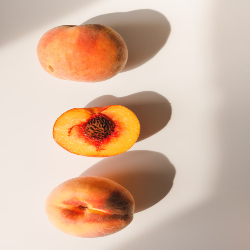Avocado Nutrition facts
Avocado

Avocados are characteristically buttery yet subtly flavorful pear-shaped fruits of Central American origin. Unlike most other fruits, they feature high-fat content and carry more calories. Nonetheless, they are among the popular fruits having good nutrition profile and health benefiting properties.
Botanically, the fruit belongs to the family of Lauraceae, the family that also includes some special members like bay laurel, cinnamon, etc. The scientific name is Persea americana.
Some of the common names are alligator pear, aguacate, butter pear, etc.
Avocado is a medium-sized, evergreen tree that reaches about 20-30 feet in height and features a large, green foliage cover. It prefers fertile soil with high moisture to flourish. Small, light-green flowers appear during winter. In about 8-10 months after bloom, hundreds of pear-shaped green fruits cover the tree.
Similar Food
-
 Acai berry 63 Cal
Acai berry 63 Cal -
 Acerola cherry 32 Cal
Acerola cherry 32 Cal -
 Apple 52 Cal
Apple 52 Cal -
 Apricot 48 Cal
Apricot 48 Cal -
 Banana 89 Cal
Banana 89 Cal
Source of Calorie
-
Carbs8.53 g 20%
-
Protein2.00 g 5%
-
Fat14.66 g 75%
How long to burn off 160 Calories?
*Approximate base minutes for a 25-year-old, 65 kg adult at moderate intensity.
| Nutrition Principle | Nutrition Value | Percentage of RDA |
|---|---|---|
| Principle | ||
| Energy | 160 Kcal | 8% |
| Carbohydrates | 8.53 g | 6.5% |
| Protein | 2.0 g | 3.5% |
| Total Fat | 14.66 g | 48% |
| Cholesterol | 0 mg | 0% |
| Dietary Fiber | 6.7 g | 18% |
| Vitamins | ||
| Folates | 81 µg | 20% |
| Niacin | 1.738 mg | 11% |
| Pantothenic acid | 1.389 mg | 28% |
| Pyridoxine | 0.257 mg | 20% |
| Riboflavin | 0.130 mg | 10% |
| Thiamin | 0.067 mg | 5.5% |
| Vitamin-A | 146 IU | 5% |
| Vitamin-C | 10 mg | 17% |
| Vitamin-E | 2.07 mg | 14% |
| Vitamin-K | 21 µg | 17.5% |
| Electrolytes | ||
| Sodium | 7 mg | 0.5% |
| Potassium | 485 mg | 10% |
| Minerals | ||
| Calcium | 12 mg | 1% |
| Copper | 0.190 mg | 21% |
| Iron | 0.55 mg | 7% |
| Magnesium | 29 mg | 7% |
| Manganese | 0.142 mg | 6% |
| Phosphorus | 52 mg | 7% |
| Selenium | 0.4 µg | <1% |
| Zinc | 0.64 mg | 6% |
| Phyto-nutrients | ||
| Carotene-&alpha | 24 µg | -- |
| Carotene-ß | 62 µg | -- |
| Cryptoxanthin-ß | 28 µg | -- |
| Lutein-zeaxanthin | 271 µg | -- |